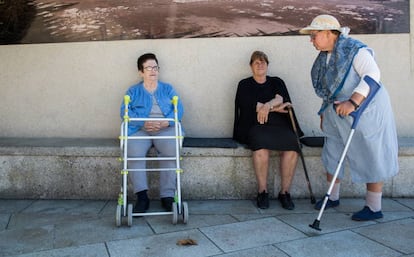Spain has lowest annual mortality rate in the EU
In 2016, there were 829 deaths for every 100,000 people, far below the average of 1,002


Spain has the lowest annual mortality rate in the European Union. In 2016 there were 829 deaths for every 100,000 inhabitants, below the European average of 1,002, according to figures released on Tuesday by Eurostat, the EU¡¯s statistics office.
Besides Spain, the three other countries with the lowest annual mortality rate that year were France (838 for every 100,000), Italy (843) and Malta (882). At the other end of the spectrum, the highest rates were found in Bulgaria (1,600), Latvia and Romania (tied at 1,476).
The causes of death did not change from previous studies: of the 5.1 million deaths that occurred across the EU in 2016, 36% were caused by cardiovascular disease, mostly heart attacks and strokes. The second largest group, representing 26% of the total, was cancer. The only countries where cancer was the leading cause of death were Denmark, France, the Netherlands and the United Kingdom.
We shouldn¡¯t be complacent when we compare ourselves with other European countries; we should analyze where we are failing and predict how this could impact future mortality
Ildefonso Hern¨¢ndez, Miguel Hern¨¢ndez University
In Spain, the low mortality rate is combined with a high life expectancy: 83 years, compared with the Organization for Economic Cooperation and Development (OECD) average of 80.6 years, which puts Spain second behind Japan.
¡°Despite Spain¡¯s privileged situation, the pending challenge is to reduce arteriosclerosis, which is the ageing of arteries and buildup of fat and bad cholesterol on artery walls,¡± says Manuel Anguita, president of the Spanish Cardiology Society. This physician notes that 50% of the population has excessive levels of bad cholesterol due to poor diets, lack of exercise, and in some cases due to genetic factors.
Spain¡¯s traditional diet and a lifestyle that favors outdoor exchanges with friends and family have also been mentioned as factors that help reduce mortality. ¡°Although Scandinavian countries have a higher per capita GDP ¨C Sweden ranks 17th and Spain 34th, according to the International Monetary Fund ¨C Mediterranean countries have a lifestyle that favors longevity,¡± says Anguita.
Public healthcare
Practically the entire Spanish population (99.8%) has access to free public healthcare, two points above the OECD average. However, investment during the economic crisis, between 2009 and 2013, grew only 0.6 percentage points, compared with earlier rates of 3.4 points. Public spending on healthcare in 2016 was around €2,800 per inhabitant, well below the OECD average of €3,400.
Despite Spain¡¯s privileged situation, the pending challenge is to reduce arterioesclerosis
Manuel Anguita, Spanish Cardiology Society
¡°We shouldn¡¯t be complacent when we compare ourselves with other European countries; we should analyze where we are failing and predict how this could impact future mortality,¡± says Ildefonso Hern¨¢ndez, a professor of preventive medicine and public health at Miguel Hern¨¢ndez University.
One of the issues to take into account, says this expert, is child poverty, where Spain has one of the highest rates in the EU (28.3%), ranking third after Romania (32.2%) and Bulgaria (29.2%).
¡°That segment of the population is being exposed to cheap food that is poor in nutrition. This intake increases the risk of cardiovascular disease and even though its impact is not visible yet, it will be.¡±
Experts also point to a new spike in smoking, which could increase cancer rates and cardiovascular diseases.
English version by Susana Urra.
Tu suscripci¨®n se est¨¢ usando en otro dispositivo
?Quieres a?adir otro usuario a tu suscripci¨®n?
Si contin¨²as leyendo en este dispositivo, no se podr¨¢ leer en el otro.
FlechaTu suscripci¨®n se est¨¢ usando en otro dispositivo y solo puedes acceder a EL PA?S desde un dispositivo a la vez.
Si quieres compartir tu cuenta, cambia tu suscripci¨®n a la modalidad Premium, as¨ª podr¨¢s a?adir otro usuario. Cada uno acceder¨¢ con su propia cuenta de email, lo que os permitir¨¢ personalizar vuestra experiencia en EL PA?S.
?Tienes una suscripci¨®n de empresa? Accede aqu¨ª para contratar m¨¢s cuentas.
En el caso de no saber qui¨¦n est¨¢ usando tu cuenta, te recomendamos cambiar tu contrase?a aqu¨ª.
Si decides continuar compartiendo tu cuenta, este mensaje se mostrar¨¢ en tu dispositivo y en el de la otra persona que est¨¢ usando tu cuenta de forma indefinida, afectando a tu experiencia de lectura. Puedes consultar aqu¨ª los t¨¦rminos y condiciones de la suscripci¨®n digital.










































